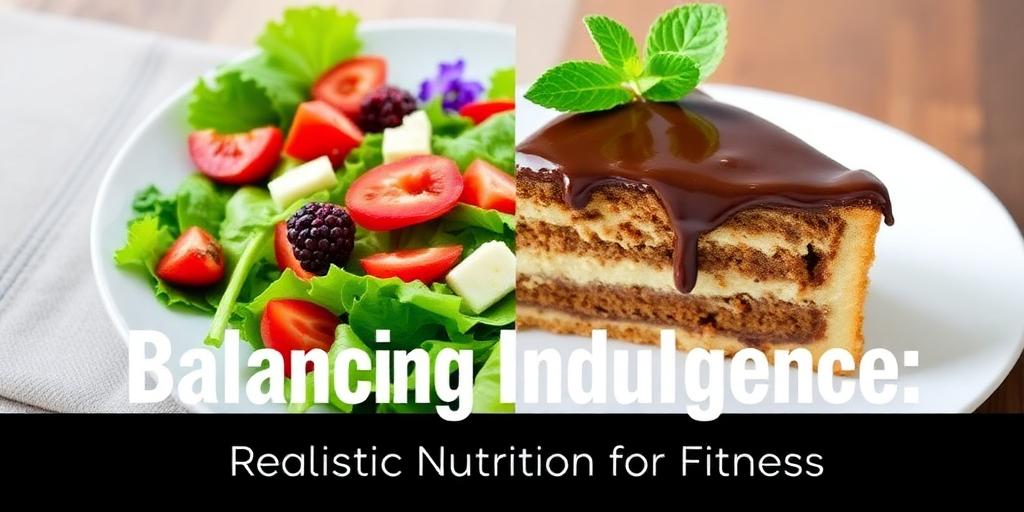Balancing Indulgence: Realistic Nutrition for Fitness
Maintaining a healthy lifestyle often feels like a constant battle between discipline and desire. When it comes to fitness, nutrition plays a pivotal role, but the idea of completely eliminating indulgent foods can be daunting and unsustainable. This post explores how to strike a balance, allowing for occasional treats while still achieving your fitness goals.
Understanding the Basics of Nutrition for Fitness
Before diving into indulgence, it's crucial to understand the core principles of fitness nutrition. This involves:
- Macronutrients: Protein, carbohydrates, and fats are the building blocks of your diet. They provide energy and support muscle growth and repair.
- Micronutrients: Vitamins and minerals are essential for overall health and optimal bodily function.
- Caloric Balance: Consuming the right amount of calories to support your activity level and fitness goals (whether it's weight loss, maintenance, or gain).
The Problem with Restrictive Diets
Many fitness enthusiasts adopt highly restrictive diets, cutting out entire food groups or severely limiting calories. While this may lead to short-term results, it often backfires due to:
- Nutrient Deficiencies: Restricting food variety can lead to deficiencies in essential vitamins and minerals.
- Increased Cravings: Deprivation often leads to intense cravings, making it harder to resist unhealthy foods.
- Psychological Impact: Restrictive diets can lead to feelings of guilt, anxiety, and an unhealthy relationship with food.
- Sustainability Issues: Extremely restrictive diets are hard to maintain long-term, leading to yo-yo dieting and frustration.
Finding the Balance: Strategies for Indulgence
The key to sustainable fitness nutrition is finding a balance that allows for occasional indulgences without derailing your progress. Here are some effective strategies:
- The 80/20 Rule: Aim to eat nutrient-dense, whole foods 80% of the time, and allow yourself to indulge in your favorite treats for the remaining 20%. This provides flexibility without sacrificing overall health.
- Mindful Indulgence: Instead of mindlessly consuming treats, practice mindful eating. Savor each bite, pay attention to your body's cues, and stop when you're satisfied.
- Strategic Timing: Plan your indulgences around your workouts. Enjoying a treat after a strenuous workout can help replenish glycogen stores and satisfy cravings without significant impact.
- Portion Control: Enjoy your favorite foods in moderation. Instead of eating an entire pizza, have a slice or two alongside a healthy salad.
- Healthy Swaps: Find healthier alternatives to your favorite indulgences. For example, try a homemade smoothie with protein powder instead of a milkshake, or bake sweet potato fries instead of regular fries.
- Plan Ahead: Incorporate planned "treat meals" or snacks into your weekly diet. This way, you can look forward to them without feeling guilty.
- Focus on Progress, Not Perfection: It's okay to occasionally deviate from your plan. The most important thing is to maintain consistency over the long term.
Sample Meal Plan with Balanced Indulgence
Here’s a sample meal plan incorporating the principles discussed:
- Breakfast: Oatmeal with berries and nuts
- Lunch: Grilled chicken salad with mixed greens and avocado
- Snack: Greek yogurt with a drizzle of honey
- Dinner: Salmon with roasted vegetables
- Treat: Small portion of dark chocolate after dinner
Long-Term Sustainability
Balancing indulgence is crucial for long-term adherence to a healthy lifestyle. By adopting a flexible approach and focusing on overall dietary patterns rather than strict restrictions, you can enjoy your favorite foods without compromising your fitness goals. Remember, consistency and moderation are key.
Conclusion
Realistic nutrition for fitness is about finding a sustainable balance that allows you to enjoy life's pleasures while still achieving your health and fitness goals. By understanding the principles of nutrition, avoiding restrictive diets, and adopting strategies for mindful indulgence, you can create a healthy and enjoyable relationship with food. Remember, it’s a journey, not a destination, so embrace the process and celebrate your progress along the way.









